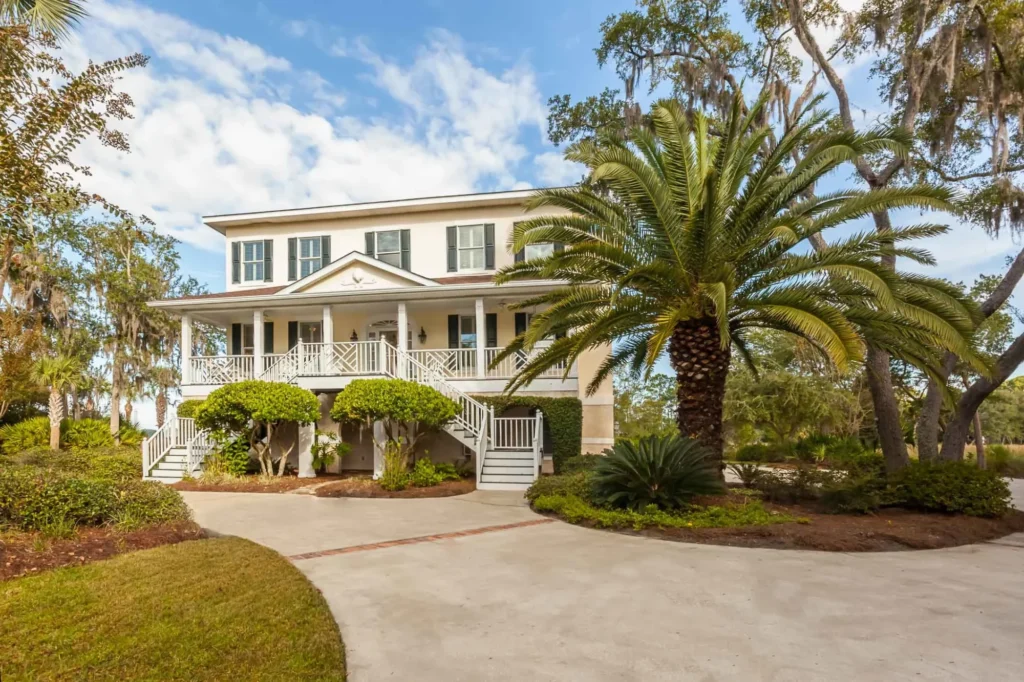
Scorpion Control and Prevention in Folly Beach, SC
Scorpions are venomous arthropods that can pose real risks when they share space with your family. In Folly Beach, SC, warm, humid ocean air, salt-tolerant landscaping, and stilted beach cottages with ventilated crawl spaces create sheltered microhabitats where scorpions and their insect prey thrive. Store-bought sprays rarely solve the problem because scorpions hide deep in cracks and voids during the day and emerge at night—so the most reliable path to lasting relief is a professional plan that finds every entry point, treats where scorpions actually live, and hardens your home against re-entry.
At All U Need Pest Control, we specialize in scorpion control along the barrier islands and marsh edges—from Folly Road (SC-171) to East/West Ashley Avenue, around Center Street, and marshside streets facing the Folly River. Since 2003, our team has delivered fast, long-lasting results with clear communication and careful attention to the way Lowcountry coastal homes are built. We customize solutions to your structure and landscaping while keeping your family and pets in mind.
Below, you’ll learn how scorpions get established, what effective control looks like in Folly Beach, and how All U Need Pest Control helps create a safer, more comfortable home. If you’re ready for help now, call 1 (888) 239-BUGS.
Pest Control Services in Folly Beach, SC
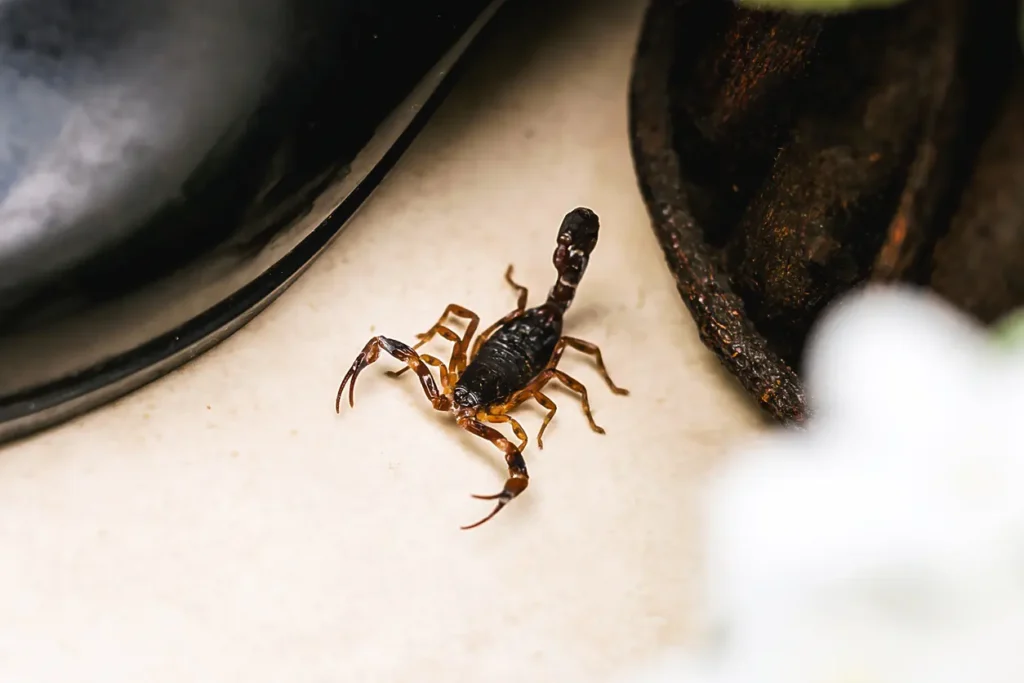
How to Get Rid of Scorpions in Folly Beach, SC
Several scorpion species occur in the Southeast. Around Folly Beach, the southern devil (unstriped) scorpion is the most likely native encounter, but any structure can receive occasional “hitchhiker” species via deliveries, landscaping materials, or travel. Regardless of species, the solution is the same: inspect precisely, identify correctly, treat targeted harborage, and close the building envelope.
- Inspection first. We map where scorpions hide and travel—open crawl spaces beneath stilted homes, porch steps and lattice, expansion joints, meter boxes, AC line penetrations, attic and gable vents, outdoor shower surrounds, deck stairs, and gaps around doors and windows exposed to salt-worn weatherstripping.
- Clear identification. Species and pressure level guide product choice and exclusion details; correct ID avoids wasted treatment in low-yield areas.
- Targeted treatments. We use pro-grade applications in cracks, crevices, and voids; pair this with habitat modifications so insects (the scorpion food source) decline too.
- Exclusion and prevention. Once active harborage is neutralized, we seal gaps, improve door thresholds/sweeps, screen vents with pest-rated mesh, and recommend moisture and lighting tweaks to reduce future pressure—important on a breezy, salt-air island.
Because scorpions sting defensively, prompt action protects your family. Symptoms of stings can include localized pain and burning; sensitive individuals may experience more serious reactions. If severe symptoms occur, seek medical care immediately.
Inspection
We start with a pier-to-ridge survey suited to beach construction. Technicians check perimeter cracks, pilings and beam interfaces, brick or block piers, weep holes, porch steps, lattice skirts, garage-level storage under living spaces, and utility penetrations. We also inspect attic/gable vents, soffit intersections, dune-side landscape pockets (sabal palmetto, sea oats edges where allowed, jasmine and ligustrum beds), and exterior lighting zones that collect insects at dusk. Indoors, we examine baseboards, toe-kicks, closet corners, and plumbing penetrations—common travel routes in raised Folly Beach homes with frequent door cycling to decks and porches.
Identification
Accurate ID matters. We confirm whether activity aligns with southern devil scorpions (typical in our region) or a transported species. This shapes placement, product selection, and follow-up windows, especially when pressure is tied to short-term rental turnover or recent remodeling.
Targeted Treatments
Our focus is precision. We apply professional formulations into cracks and voids where scorpions harbor and travel rather than broadcasting across living areas. We may add desiccant dusts in dry voids and discreet exterior placements along expansion joints, door thresholds, slab/step seams, deck stair risers, and void entries that scorpions frequent on warm evenings after sea breezes settle.
Prevention
After knockdown, we tighten the envelope: seal utility pass-throughs, tune door sweeps, install weep-hole inserts that preserve airflow, screen attic/gable vents with pest-rated mesh, and reduce attractants like bright cool-spectrum porch lights near doors (swap to warmer-spectrum bulbs). We’ll also recommend coastal-smart landscaping adjustments that thin dense, shaded zones along foundations and pull mulch or shells back from siding to keep edges drier.

Scorpion Treatment in Folly Beach, SC
Our program blends building science with Integrated Pest Management (IPM)—addressing moisture, access, and food sources alongside targeted chemistry to fit daily life on the island.
Exclusion
Exclusion is the durable fix. We seal cracks and gaps with compatible materials (metal mesh + long-life sealant), reinforce crawl-space doors and storage enclosures beneath stilted homes, and install breathable weep-hole inserts that maintain ventilation while blocking pests. For elevated beach cottages, we harden lattice, deck stair interfaces, and outdoor shower enclosures—common on-ramps from landscape beds into subflooring.
Habitat Modification
Scorpions follow food and shelter. We reduce both by trimming vegetation off the structure, pulling pine straw/mulch back a few inches from siding, elevating stored beach gear and lumber, and correcting drainage so perimeter soil dries faster after king tides or thunderstorms. A cleaner, drier perimeter means fewer insects—and fewer scorpions.
Natural Treatments
In sensitive zones, botanical-based repellents may help deter scouting, and desiccant dusts in sealed voids can add long-term suppression. These tools supplement (not replace) core exclusion and targeted treatments.
Chemical Treatments
When pressure is moderate to high, we use low-odor, professional-grade formulations placed exactly where scorpions travel—along expansion joints, thresholds, slab/step seams, meter boxes, and utility entries—keeping applications away from pollinators and open water. Interior service targets cracks/crevices only; broad-surface living-area sprays are avoided to protect finishes and indoor air.
Integrated Pest Management
IPM means measuring and adjusting. We document placements, track pressure over follow-ups, and calibrate based on weather, site conditions, and your home’s architecture. Expect a staged plan that removes today’s population and resists tomorrow’s repopulation—especially useful when weekend visitors, beach gear, and frequent door cycles change pressure week to week.
- Inspect structure and landscape to locate harborage and access.
- Treat with precise, family-conscious applications.
- Exclude and maintain with seasonal check-ins or light exterior service.
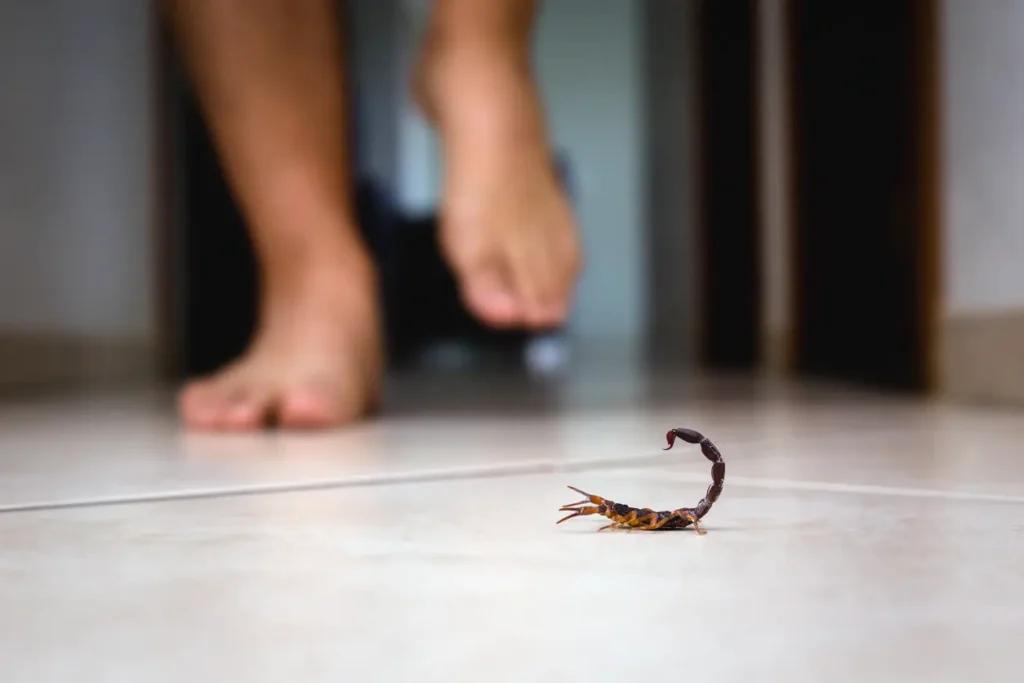
Signs of a Scorpion Infestation in Folly Beach, SC
Early clues help you act before populations build.
Scorpion Sightings
Nighttime sightings along baseboards, in bathrooms, or near garage/porch thresholds are common. Outdoors, look beneath planters, stacked lumber, stored beach gear bins, and debris piles; under steps; and around AC pads and hose bibs.
- Open crawl spaces and piling/pier perimeters.
- Attics and gable/soffit interfaces near ocean-exposed rooflines.
- Under kitchen/bath cabinets (plumbing penetrations).
- Beneath rocks, pavers, deck stairs, and wood piles.
Scorpion Droppings
Small, dark droppings can collect near favored perches or void entries. Any concentrated droppings in a crawl space or along ground-level storage walls warrant inspection and targeted treatment.
Shed Exoskeletons
Cast skins—often in corners or behind stored items—indicate growing individuals and established harborage nearby, common around outdoor showers or under stair landings.
Nearby Construction or Yard Changes
Renovations, deck work, dune walkover repairs, new shell or mulch deliveries, or neighborhood construction can displace scorpions and push them toward the structure. If you’ve recently refreshed beds or added hardscape, a post-project inspection helps prevent surprises.
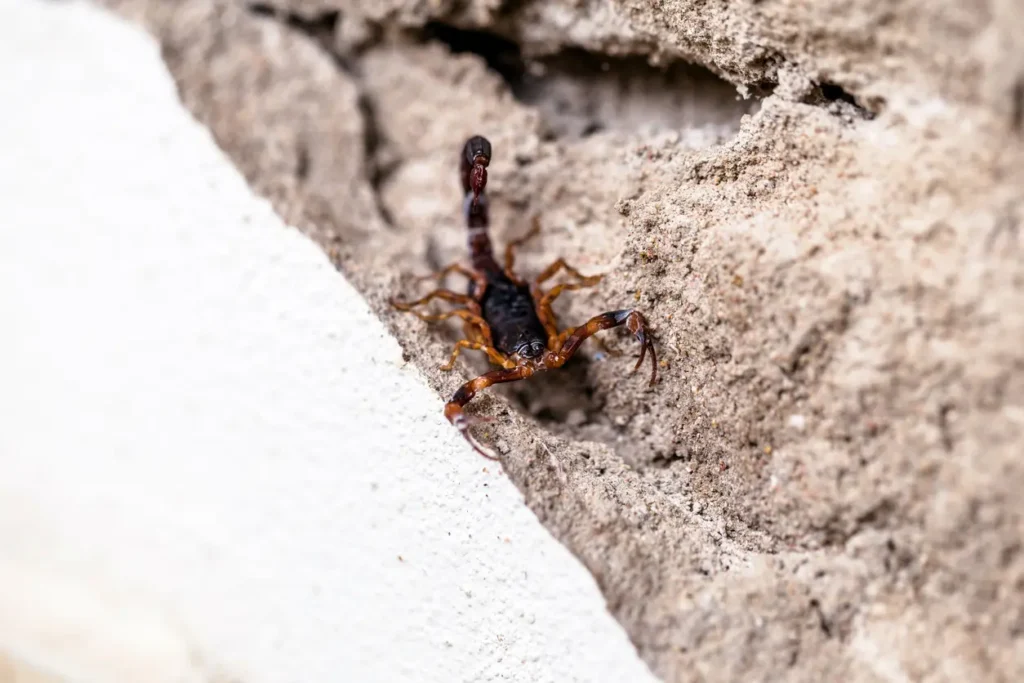
How to Check for Scorpions
Check at night with a UV flashlight—scorpions fluoresce and are easier to spot. Move slowly; wear closed-toe shoes and gloves.
- Inspect crawl-space entries, porch steps, deck stairs, and lattice seams.
- Scan baseboards, closets, and under-sink cabinets indoors.
- Check stacked items, wood piles, beach gear bins, and paver edges outdoors.
Never handle a live scorpion with bare hands. If you must collect a specimen, use long tweezers/forceps and a lidded container. For stings, clean the site, apply a cold pack, and seek medical attention if severe symptoms (trouble breathing, widespread swelling, or systemic reactions) appear.
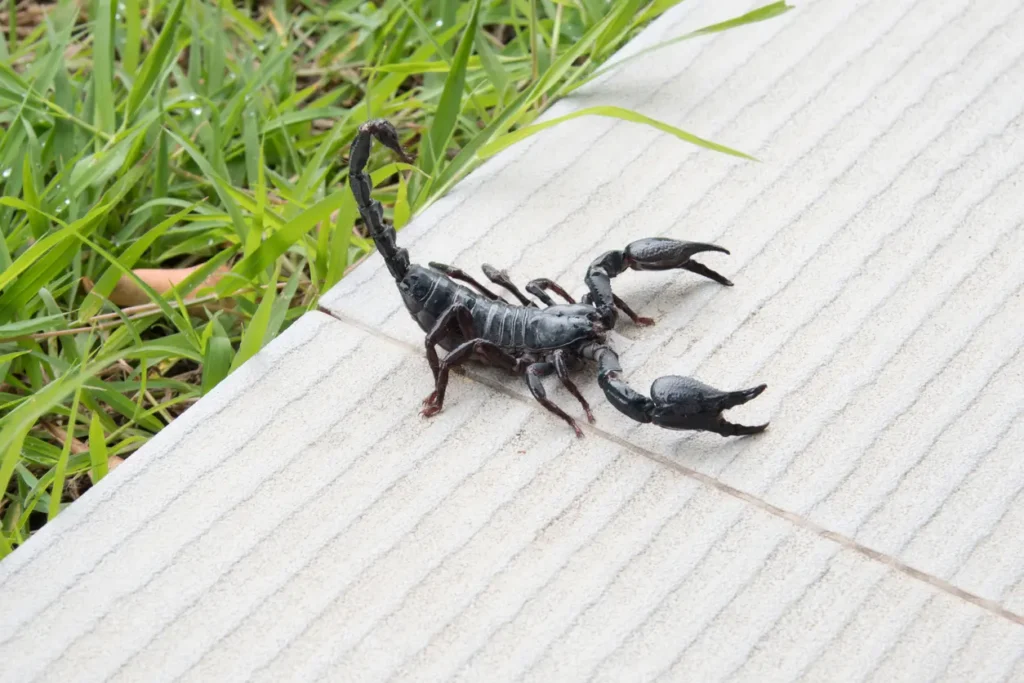
Types of Scorpions in Folly Beach, SC
Southern Devil (Unstriped) Scorpion
The most commonly encountered native species in coastal South Carolina. Typically small to medium, it favors cool, dark spaces—under debris, in crawl-space margins, and in tight structural gaps around foundations, porch steps, and deck stairs.
Occasional Hitchhikers (Transported Species)
Landscape materials, freight, or personal travel can rarely introduce other scorpions to island homes. Correct identification guides treatment and follow-up, and exclusion keeps one-off introductions from becoming recurring problems.

Scorpion Prevention in Folly Beach, SC
Layer simple, coastal-smart steps to keep pressure low year-round.
- Seal the shell. Add door sweeps and weatherstripping; caulk trim joints; seal utility penetrations with metal mesh + sealant; install pest-rated mesh on attic/gable vents; fit breathable inserts into weep holes.
- Reduce harborage. Elevate storage; thin dense shrubs; keep firewood, construction materials, and beach gear bins off the ground and away from walls; pull mulch or shells back from siding.
- Dry the perimeter. Extend downspouts; fix gutter leaks; improve grading where water pools near steps or pilings; ventilate crawl spaces properly to offset sea-air humidity.
- Dim the draw. Shift to warmer-spectrum porch bulbs and relocate bright fixtures away from doors to reduce insect prey—and the scorpions that hunt them.
- Control other pests. Reducing roaches, crickets, and other insects removes scorpion food sources and lowers pressure.
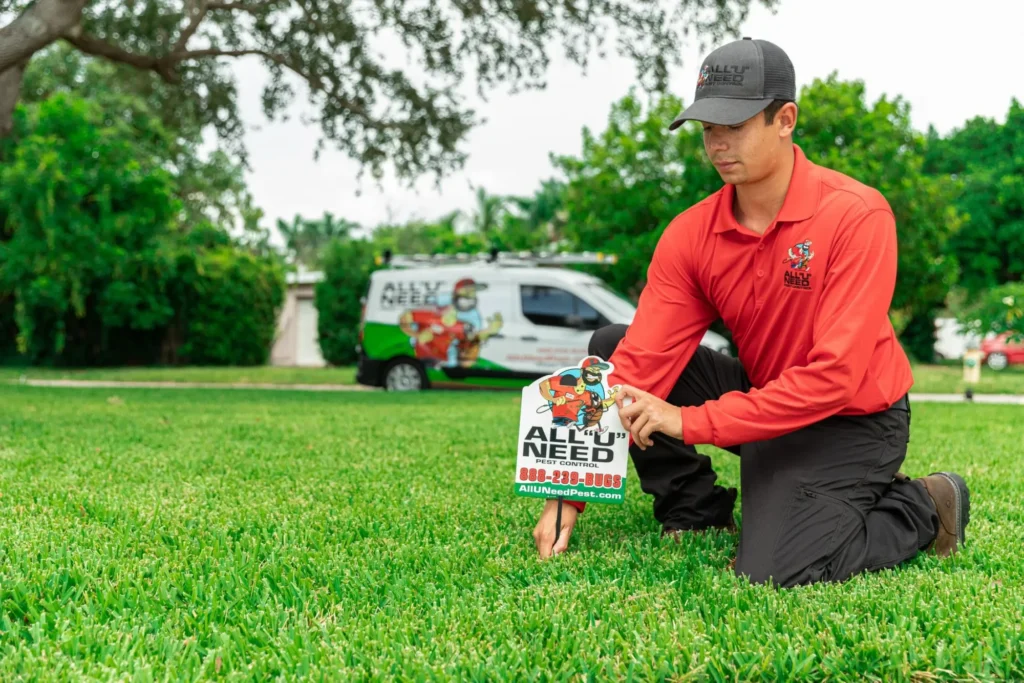
Choose All U Need Pest Control for Scorpion Prevention in Folly Beach, SC
Scorpions don’t have to be part of island living. All U Need Pest Control delivers a Folly Beach–specific approach—precise treatments, durable exclusions, and practical moisture/landscape fixes that make your home a poor target. You’ll get transparent pricing, clear prep guidance, and fast follow-through. If activity persists, we return and adjust until your home is comfortable again.
Call 1 (888) 239-BUGS to schedule your free inspection. We’ll inspect, remove, and fortify—so you can enjoy sunrise walks, porch evenings, and beach weekends on Folly without surprises.
Location Contact:
419 N Cedar St Summerville, SC 29483
Get Directions for 419 N Cedar StSummerville, SC 29483 on Google Maps843-489-8818
Call All "U" Need Pest Control